The Design and Evaluation of the Comprehensive Hospitalist Assessment and Mentorship with Portfolios (CHAMP) Ultrasound Program
BACKGROUND: Literature supports the use of point-of-care ultrasound performed by the treating hospitalist in the diagnosis of common diseases. There is no consensus on the training paradigm or the evaluation of skill retention for hospitalists.
OBJECTIVE: To evaluate the effectiveness of a comprehensive bedside ultrasound training program with postcourse competency assessments for hospitalists.
DESIGN: A retrospective report of a training program with 53 hospitalists. The program consisted of online modules, a 3-day in-person course, portfolios, 1-day refresher training, monthly scanning, and assessments. Hospitalists were rated by using similar pre- and postcourse competency assessments and self-rating parameters during the 3-day and refresher courses.
SETTING: A large tertiary-care center.
RESULTS: Skills increased after the 3-day course from a median preassessment score of 15% correct (interquartile range [IQR] 10%-25%) to a median postassessment score of 90% (IQR 80%-95%; P < .0001). At the time of the refresher course, the median precourse skills score had decreased to 65% correct (IQR 35%-90%), which improved to 100% postcourse (IQR 85%-100%; P < .0001). Skills scores decreased significantly less between the post 3-day course assessment and pre 1-day refresher course for hospitalists who completed portfolios (mean decrease 13.6% correct; P < .0001) and/or monthly scanning sessions (mean decrease 7.3% correct; P < .0001) compared with hospitalists who did not complete these items.
CONCLUSIONS: A comprehensive longitudinal ultrasound training program including competency assessments improved ultrasound acquisition skills with hospitalists. Skill retention remained high in those who completed portfolios and/or monthly scanning sessions along with a 1-day in-person refresher course.
© 2018 Society of Hospital Medicine
Statistical Analysis
Demographics of the included hospitalist population and pre and post 3-day assessments, including knowledge score, skills score, confidence in ultrasound use, confidence in volume management, and quality of physical exam, were summarized. Values for all assessment variables are presented as percentages. Confidence scores were reported as a percentage of the Likert scale (eg, 4/5 was reported as 80%). Skills and written examinations were expressed as percentages of items correct. Data were reported as median and interquartile range or means and standard deviation based on variable distributions. Differences between pre- and postvalues for 3-day course variables were assessed by using 2-sample paired Wilcoxon signed rank tests with a 95% confidence level.
For the subset of hospitalists who also completed the 1-day course, pre and post 1-day course assessments, including skills score, confidence in ultrasound use, confidence in volume management, and quality of physical exam, were summarized. Differences between pre- and postvalues for 1-day assessment variables were assessed by using 2-sample paired Wilcoxon signed rank tests with a 95% confidence level.
Multiple linear regression was performed with the change in skills assessment score from postcompletion of the 3-day course to precompletion of the 1-day course as the dependent variable. Hospitalists were split into 2 age groups (30-39 and 40-49) for the purpose of this analysis. The percent of monthly scanning sessions attended, age category, timing of 1-day course, and percent portfolio were assessed as possible predictors of the skills score by using simple linear regression with a P = .05 cutoff. A final model was chosen based on predictors significant in simple linear regression and included the percent of the portfolio completed and attendance of monthly scanning sessions.
RESULTS
Demographics
3-Day In-Person Course
For the 53 hospitalists who completed skills-based assessments, performance increased significantly after the 3-day course. Knowledge scores also increased significantly from preassessment to postassessment. Self-reported confidence ratings for ultrasound use, confidence in volume management, and quality of physical exam all increased significantly from preassessment to postassessment (Table 2).
Refresher Training: 1-Day In-Person Course
Because the refresher training was encouraged but not required, only 25 of 53 hospitalists, 23 with complete data, completed the 1-day course. For the 23 hospitalists who completed skills-based assessments before and after the 1-day course, mean skills scores increased significantly (Table 2). Self-reported confidence ratings for ultrasound use, confidence in volume management, and quality of physical exam all increased significantly from preassessment to postassessment (Table 2).
Monthly Scanning Sessions and Portfolio Development
The skills retention from initial course to refresher course by portfolio completion and monthly scanning sessions is shown in Table 2. Multiple regression analysis showed that for every 10% increase in the percent of monthly sessions attended, the mean change in skills score was 3.7% (P = .017), and for every 10% increase in the percent of portfolio completed, the mean change in skills score was 2.5% (P = .04), showing that both monthly scanning session attendance and portfolio completion are significantly predictive of skills retention over time.








